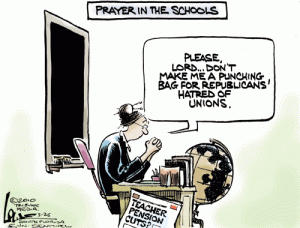The CEO of Whole Foods is a libertarian who doesn’t support the Patient Protection and Affordable Care Act. Target gave $150,000 to a conservative Minnesota Political Action Committee that endorsed an anti-gay candidate for governor. S. Truett Cathy, the founder of Chick-Fil-A, is a right-wing religious conservative who propagandizes Focus on the Family in his restaurants’ happy meals. Wal-Mart is just plain evil. So where is it safe to shop? How can I know that my money isn’t supporting evil? And how do I look at myself in the mirror after I’ve eaten a delicious Chick-Fil-A sandwich?
I’ve been boycotting Target since last summer, when a gay rights group blew their cover and announced that the Minneapolis-based big box had donated $150,000 to MN Forward, a PAC that backed a right wing, anti-gay, anti-union candidate for governor. Since Target was previously known as a pro-gay company that often sponsored LGBT community events, a number of gay-rights groups immediately called for a boycott and demanded that Target apologize and make an equal donation to a Minnesota gay rights organization (Target was a “Silver Sponsor” of 2010’s Twin Cities Pride, meaning the company donated between $15,000 and 25,000 in goods or services). When I found out about the MN Forward donation, I wrote an angry note and mailed it to Target with my TargetCard bill. The response letter I received- signed simply “Mary”- insisted that Target values all of its customers but makes these decisions based on the interest of the company. Well I make decisions (most of the time) in the best interest of my conscience, so I’m boycotting.
The Human Rights Campaign, the nation’s largest gay rights organization, releases an annual “Buying Guide for Workplace Equality.” The guide ranks hundreds of companies based on their workplace policies regarding LGBT employees. Until recently, Target’s rating was a perfect 100, indicating employee protections based on sexual orientation and gender identity, domestic partner benefits, a company-supported resource group for LGBT employees, etc. However, after the MN Forward incident, the HRC docked them 15 points for “engaging in action that would undermine the goal of LGBT equality.”
This is where it gets tricky for me. It is entirely possible for an organization to provide parity in benefits for LGBT employees and same-sex couples while also participating in activities that directly harm those same employees. So while Target’s current score of 85 is in the HRC’s “green zone” of companies that receive a score of 80-100, I still refuse to shop there. Meanwhile, Chipotle has a score of 30, but does not engage in these negative activities. Chipotle does have a non-discrimination policy that includes sexual orientation and they provide domestic partner benefits, but does not comply with the HRC’s other criteria. It’s not that Chipotle is doing harm in the same way Target is, but the former is taking positive steps towards improving the lives of LGBT employees, while the latter is regressing. (NB: I’ve heard rumors that Chipotle was under fire for dismissing a number of immigrant workers in Minneapolis, but I’ve yet to find a credible source on this.)
When I eat at Chick-Fil-A, I feel a little dirty. I know that the CEO is a conservative Southern Baptist who requires that all franchises close their doors on Sunday (because you shouldn’t conduct business on the Lord’s day.) But I also know that Mr. Cathy insists that employees respond to every question and request with “my pleasure.” He is a Southern gentleman, after all. The important thing for me is that this chain makes no secret of its political leanings. So when I stop by once every 3 months for a sandwich, I know where my five dollars is going. (I try to wait until I have a coupon so they don’t make quite as much money on me.) A true friend stabs you in the front, right?
For a glorious few weeks in early March, it looked as though Target may have finally been ready to make amends with the gay community. On February 10, Target posted a press release announcing the exclusive distribution of a special edition of Lady Gaga’s new album The Advocate. As part of their agreement, Gaga asked Target to “start affiliating themselves with LGBT charity groups and begin to reform and make amends for the mistakes they’ve made in the past…our relationship is hinged upon their reform in the company to support the gay community and to redeem the mistakes they’ve made supporting those groups.” Unfortunately, less than a month after that press release, the deal was off. Citing Target’s unwillingness to adhere to her strict pro-gray requirements, Gaga backed out of the deal.
So the boycott rages on. My underwear collection is growing thin, and so too will my sock collection, but that’s a small price to pay for peace of mind. Target is one of those stores where you can’t just go and get that one thing they need. You’ll inevitably end up with pajama pants, a DVD or two, and a three-gallon tub of goldfish crackers. So my boycott is not only saving me money, it’s also forcing me to reconsider what I actually need and where to buy it. I recently discovered a Baltimore-based company called Ecosumo, which sells eco-friendly products from shoes to housewares to soap. I’m guessing that they don’t have a comprehensive non-discrimination policy and parity in at least one transgender wellness benefit, but they are small (I think they have three employees, including the two co-founders) and local and eco-friendly. So I can feel good about shopping there.








